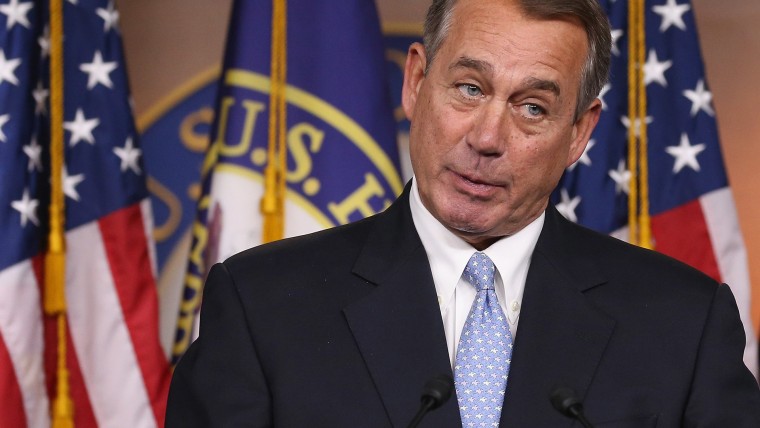The drama on Capitol Hill this morning was on passing the annual military spending bill known as the National Defense Authorization Act (NDAA), but before we get into that, it's important to note the degree to which Republicans made the bill a test of patriotism.
The New York Times' report, for example, flagged these quotes from House Speaker John Boehner (R-Ohio).
Mr. Boehner, urged Democrats to support the bill, saying it should not be "a tough vote." "This vote is about whether you support our men and women in uniform," Mr. Boehner told reporters Thursday.
The Republican leader added, before the vote, "I think it's downright shameful that [Democrats are] even contemplating turning their backs on American troops." After the vote, the Speaker added, "With all the threats our troops face and the sacrifices they make, Democrats' opposition to this defense bill is in fact indefensible."
This is a family blog, so let's just say Boehner's rhetoric is in fact bullpucky.
In the broadest possible sense, it's true that the NDAA funds the military, but to suggest that the spending bill is evidence of lawmakers' support for American troops is ridiculous. For one thing, a handful of Republicans voted against the NDAA this morning, and it's bizarre for the Speaker to suggest some of his own members don't support American servicemen and women.
For another, the spending bill included all kinds of controversial provisions, and the parties have genuine policy differences. That doesn't make opponents anti-military.
And finally, there's the small matter of Boehner himself voting against the NDAA in 2009 and 2010 when Republicans were in the minority. If a member's vote on this spending bill is "about whether you support our men and women in uniform," John Boehner fails his own test of patriotism.
By his own reasoning, the Speaker himself has "turned his back on American troops."
In reality, of course, Boehner hasn't done anything of the sort, but therein lies the point -- the 151 members from both parties who voted against the NDAA are no less patriotic or pro-military than the 269 members who voted for it. Democrats didn't question Boehner's love of country in 2009 and 2010 when he voted against funding the the military, which only makes his antics this week more offensive.
As for the substance of the NDAA itself, one of the major points of contention was about the budgetary process. From the Times' piece:
Democrats were particularly upset over Republican attempts to circumvent the across-the-board spending cuts known as sequestration that began in 2013, saying they could not accept any increases in military spending without equivalent increases for other programs. But in a maneuver intended to skirt the military spending caps, the legislation includes roughly $39 billion in an Overseas Contingency Operations fund, which is reserved for emergency military operations and exempt from sequestration.
For Democrats, the problem isn't that Republicans are blowing past their own spending caps, per se. Rather, House Dems have effectively said, "If Republicans can ignore the caps for the Pentagon, let's also ignore the caps for domestic priorities."
To which GOP leaders have effectively replied, "No, we'll spend more on our priorities and less on yours."
There were related disputes over the detention facility at Guantanamo Bay, military pay, and servicemember pay.
The spending bill now heads to the Senate.
